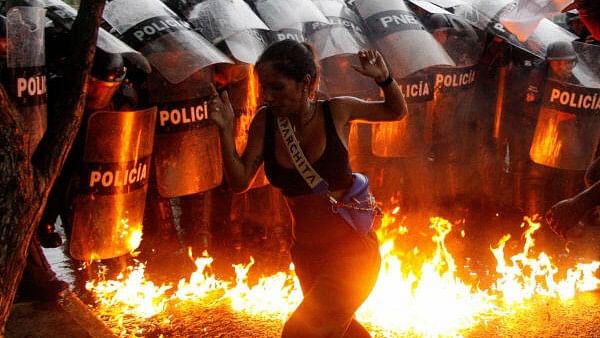
A demonstrator reacts when Molotov cocktails hit the ground in front of security forces during protests against election results after Venezuela's President Nicolas Maduro and his opposition rival Edmundo Gonzalez claimed victory in Sunday's presidential election, in Puerto La Cruz, Venezuela July 29, 2024.
Credit: Reuters Photo
Caracas: Venezuela's opposition said it had voting-tally proof it had won the election claimed by President Nicolas Maduro, as anti-government protests erupted across the country, with police firing tear gas to disperse protesters in the capital Caracas.
Protesters took to the streets after Maduro was declared winner of the disputed poll, including near the presidential Miraflores palace in Caracas.
Many staged "cacerolazo" demonstrations across the country - a traditional Latin American protest in which people bang pots and pans. Some who later marched took their pots and pans with them.
"I don’t want gold, I don’t want CLAP (the government food aid programme), I want Nicolas (Maduro) to leave," chanted protesters banging pots.
Many rode motorbikes and jammed streets or draped themselves in the Venezuelan flag, while others covered their faces with scarves as protection against tear gas.
In Caracas, heavily armed police sent protesters running when they fired tear gas to disperse a crowd, while other police erected barriers with long shields and batons.
In Coro, the capital of Falcon state, protesters cheered and danced when they tore down a statue depicting late president Hugo Chavez, Maduro's mentor.
The Venezuelan Conflict Observatory said it had registered 187 protests in 20 states as of 6 p.m..
"I’ll fight for my country’s democracy. They stole the election from us," an unidentified protester told Reuters. "We need to keep on fighting for the youth."
Maduro blames extreme right
Maduro, in a live broadcast from the presidential palace, said his forces were acting against what he called violent protesters. The armed forces have long supported Maduro and there are no signs leaders were breaking from the government.
"We have been following all of the acts of violence promoted by the extreme right. I can tell the people of Venezuela that if they have done harm, we are acting," he said.
"We already know this movie, so once more, long with the civil, military and police union we are acting. We already know how they operate."
The Venezuelan Conflict Observatory said "numerous acts of repression and violence carried out by paramilitary collectives and security forces have been reported".
At least two people were killed in connection with the vote count or protests - one overnight in the border state of Tachira and another in Maracay on Monday.
Defense Minister Vladimir Padrino warned against allowing a repeat of the "terrible situations of 2014, 2017 and 2019". Anti-government protesters took to the streets those years and hundreds were killed.
Opposition says proof of victory
Electoral authorities said on Monday that Maduro had won a third term as president with 51 per cent of the vote, extending a quarter-century of socialist rule.
But the opposition said the 73 per cent of voting tallies to which it has access showed its candidate Edmundo Gonzalez had won an unassailable victory, winning more than twice as many votes as Maduro.
Independent pollsters called Maduro's claim of victory implausible, and governments in Washington and elsewhere immediately cast doubt on the results and called for a full tabulation of votes.
Uruguay's Foreign Minister Omar Paganini told CNN in an interview on Monday that his government will "never" recognize Maduro as the winner, saying the opposition had clearly won.
Peru's government ordered Venezuelan diplomats in the Andean nation to leave within 72 hours, citing "serious and arbitrary decisions made today by the Venezuelan regime."
Peru is home to one of the largest communities of Venezuelan migrants, most of whom have fled their homeland in recent years.
The Organization of American States said it would meeting on Wednesday in Washington to discuss the Venezuela election.
More street protests
Opposition leader Maria Corina Machado, who was barred from running in the poll, called in a post on X late on Monday for supporters to march on Tuesday.
"My dear Venezuelans, tomorrow we meet; as a family, organized, demonstrating the determination we have to make every vote count and defend the truth," she said.
Jorge Rodriguez, a ruling party lawmaker and Maduro's campaign manager, urged government followers to take part in marches to the presidential palace to support the government.
While Gonzalez has warned against violence, Rodriguez accused the opposition of stoking violence.
Maduro - a 61-year-old former bus driver and foreign minister - took office on reelection is president Hugo Chavez's death in 2013 and his 2018 considered fraudulent by the United States and others, who call him a dictator.
Maduro has presided over an economic collapse, the migration of about a third of the population, and a sharp deterioration in diplomatic relations, crowned by sanctions imposed by the United States, the European Union and others which have crippled an already struggling oil industry.